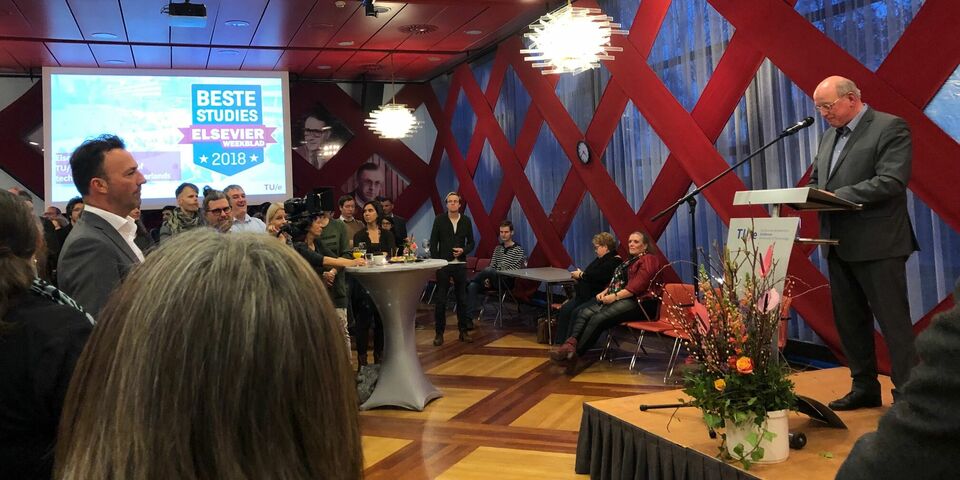Mengelers strongly criticizes minister’s interference with fixed quotas
In his last speech at the start of a new year, Chairman of the Executive Board Jan Mengelers expressed his concern over Minister of Education, Culture and Science Ingrid van Engelshoven’s interference with the right of the university to determine which programs may implement a decentralized selection procedure. Mengelers also believes that the recruitment of talented scientific personnel will prove an enormous task for the university which he is about to leave in May.
Yesterday afternoon, during the traditional opening of the New Year in the Senaatszaal of the Auditorium, Mengelers first summed up everything he believes TU/e could proudly look back on: the conclusion of the reorganization of the educational support services, the adjustments made to the ius promovendi, the Strategic Plan 2030, the new academic celebration MomenTUm and the completion of Atlas. He also said to be pleased that his own succession, as well as that of vice chairman Jo van Ham, who will also leave the university, has been arranged in time. “Robert-Jan Smits and Nicole Ummelen are both excellent candidates.”
But there are certain developments occurring outside the university with which Mengelers is much less pleased. He expects major problems as a result of minister Ingrid van Engelhoven’s plan to introduce legislation making it impossible for universities to determine which study programs may implement a decentralized selection procedure. In October 2018, van Engelshoven announced her plan to introduce a legislative proposal intended, among other things, to reduce the number of fixed quotas to a minimum, especially for programs in sectors that are faced with labor shortages.
Mengelers: “I believe that in a year’s time, a law amendment will have made decentralized selection practically impossible. Alternative ways of selection have been made unworkable as a result of Dutch and European legislation as well. This undermines our aim for quality and controlled growth. Within a year, we will no longer have the ability to limit the influx of students. Legislation has made other, more refined mechanisms unavailable, so we will have to come up with solutions ourselves. The most recent application numbers are alarmingly high, but we shall see. Time will tell.”
Shortsighted
The retiring Chairman of the Executive Board, who will step down on 15 May, takes issue with the “shortsighted” views held by the outside world concerning the universities. “Often, people measure universities by the same standards, as if circumstances were the same everywhere. For example, how universities use their financial means for something other than education or the relief of workload. Or the opinion that accessibility of education is not sufficiently facilitated, and that there is no consideration for increasing stress among students.”
Contrary to such opinions, Dutch universities perform exceptionally well according to Mengelers, also in international perspective. “It’s amazing that all thirteen universities off our small country are in the top-200. The Netherlands have a right to be proud of that. We do our universities greater justice by actually helping them instead of constantly belittling them.”
Mengelers considers the recruitment of top talent the major challenge for the next few years. “A large group of our scientists will retire in the coming years and in 2019 alone, as many as seventy vacancies need to be filled.” He also emphasized the strong competition the university faces from the business community. “ASML has to fill a staggering number of thirty-five hundred vacancies this year.”
Looking back on his years as Chairman of the Executive Board, Mengelers feels dominantly content. “When I started in 2014, TU/e was a university with great promises, now it is a successful university with many opportunities lying ahead. And our goal is to be a leading university in Europe.”


Discussion